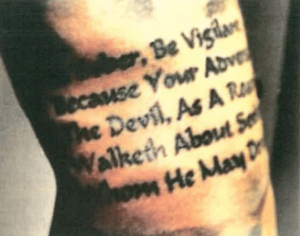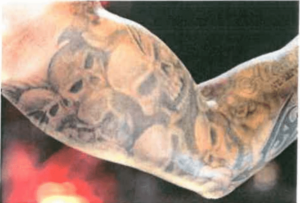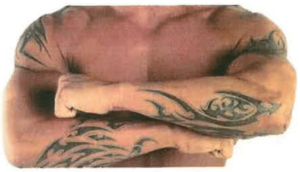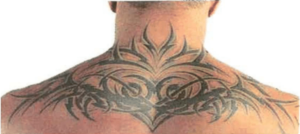Who Owns the Copyright in A Tattoo?
17 U.S.C § 201. Ownership of a Copyright.
(a) Initial Ownership. — Copyright in a work protected under this title vests initially in the author or authors of the work. The authors of a joint work are coowners of copyright in the work.
The ownership of the copyright in a tattoo has long been the subject of law school final exam questions, discussed by copyright law school professors and conference panelists. It is a unique issue that touches on a number of important copyright related questions including authorship, works made for hire, public display, right of reproduction, licensing, derivative works or modification of the original tattoo, affirmative defenses to copyright infringement, and copyright damages, as well as the related privacy and personality rights including name, image, and likeness. However, while it is a frequent topic of discussion, from a practical perspective, real world and legitimate copyright issues involving tattoos often seem farfetched. However, even though they don’t arise often, there have been instances where a tattoo artist has alleged copyright infringement to varying degrees of success. Perhaps the two most notable suits filed include a lawsuit against the owner of the NBA 2k video game franchise alleging copyright infringement of tattoo designs featured on the bodies of Lebron James, Kenyon Martin, Eric Bledsoe, and a suit filed against Warner Bros over The Hangover Part II alleging copyright infringement of Mike Tyson’s face tattoo. Both of those cases were dismissed or settled out of court.
However, a recent trial may help put an end to much of the speculation and hypotheticals. In a trial that took place last week in the Southern District of Illinois, a jury decided whether a video game company’s realistic depiction of a professional wrestler in the WWE 2K video game series infringes the tattoo artist’s copyrights in that wrestler’s tattoos. This was the first lawsuit of its kind to reach trial.
Tattoo artist Catherine Alexander brought suit against Take-Two Interactive’s depiction of tattoos that Alexander provided to wrestler Randy Orton alleging that Take-Two reproduced those tattoos without Alexander’s authorization. Alexander gave Orton the six tattoos in question between 2002 and 2008 and after Orton became a professional wrestler, the tattoos were digitally recreated in the WWE 2K16, WWE 2K17, and WWE 2K18 games. In 2018 Alexander successfully applied for and obtained copyright registrations in the six tattoo designs and subsequently filed suit against Take-Two Interactive for the unauthorized reproduction of those designs. After Alexander prevailed on numerous attempts to dismiss the suit, the trial featured testimony from professional wrestlers, copyright experts and academics, video game experts, and a wide range of other witnesses.





In this, the first ever case of its kind to reach a jury, the jury found in favor of Alexander. However, the decision was something of a hollow victory for Alexander as the jury only awarded damages of $3,750. This case illustrates many of the issues with putting a copyright case in front of a jury as the court removed many of Take Two’s potential defenses from the jury’s consideration including de minimus use, an implied license, and waiver.
While the issues are novel and some of the case specific facts are fascinating, the outcome of the case could have a significant impact on copyrights and licensing for video games, television, motion pictures, and photographs. It is too early to tell what specific impact the result could have, and the minimal damages award will likely prevent an onslaught of similar cases, but the result does indicate a potential increase in risk when using someone’s name, image, and likeness, and will likely change the way these licenses are drafted in the future.
From a practical perspective, since copyright rights can only be transferred via a signed writing, the one sure way to avoid this risk is to ensure that tattoo artists sign a copyright assignment at the time the work is completed.
Brandon W. Clark is the Chair of the Copyright, Entertainment, and Media Law Practice Group at McKee, Voorhees & Sease, PLC. For additional information please visit www.ipmvs.com or contact Brandon directly via email at brandon.clark@ipmvs.com
← Return to Filewrapper